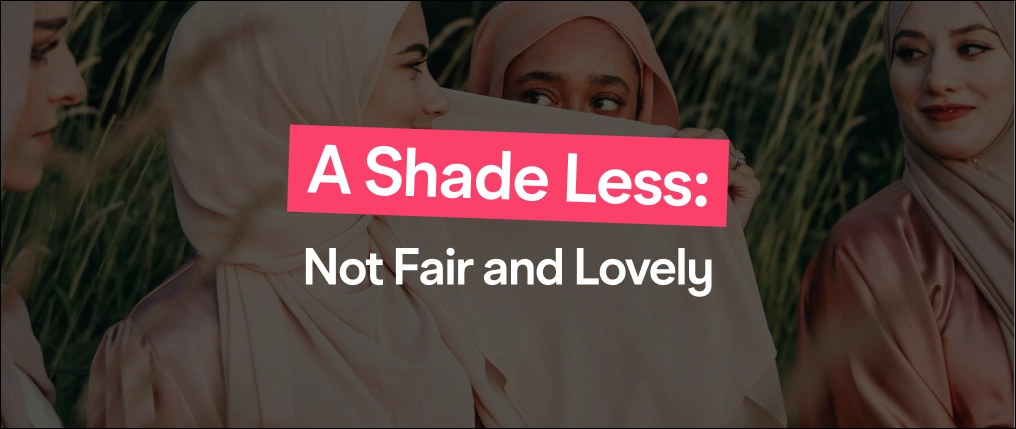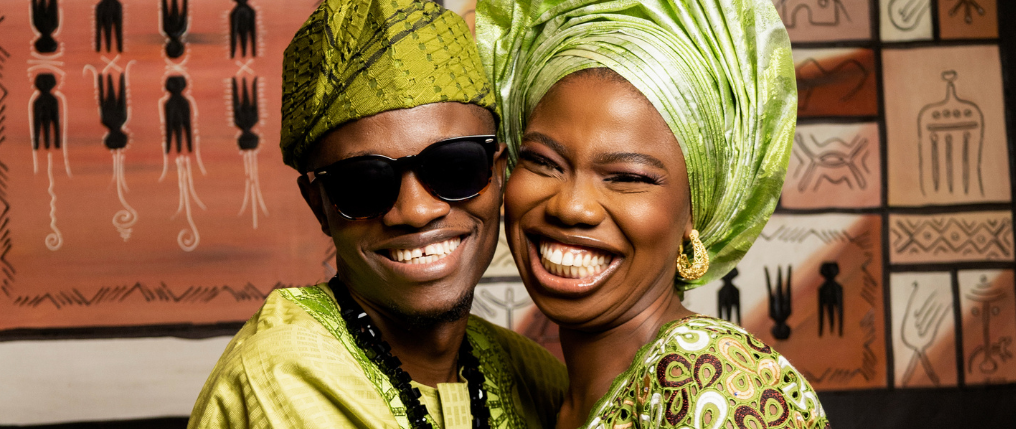
A Shade Less – Not Fair and Lovely
April 8, 2024

I remember when my second daughter was born with darker skin color than the rest of the family and I was made to feel as a mother that she was somehow less than my other daughter, less lucky, less beautiful, less.
As if she didn’t deserve to wear certain colors, and I shouldn’t rejoice in her adorableness, just because Allah had chosen for her skin color to be a shade between chocolate and caramel, instead of vanilla.


Looking for your soulmate?
You won’t find your soulmate on this blog post but you might find them on Muzz - the world’s biggest Muslim dating and marriage app.
I am not ashamed of loving her a wee bit extra, she reminds me of myself. Earthy.
I have always emphasized inner beauty, and never thought I would have to teach a daughter of mine the ‘value’ of outer beauty but I have to with her. I have to remind her that dark skin is beautiful, just as lovely to behold as light skin. This is how Allah the Mussawir chose to color her.

I don’t want her to ever feel like she has to hold back and not follow her dreams because she is made to feel less.
She is a beautiful little girl, effervescent, funny and filled with love, with a propinquity towards the dramatic. Its only on days that she is made to feel less that she visibly withers. On days when a new family will meet us and say in front of her “My! Your other three look alike and she is so …. different”.
After I posted this on my Facebook page, I received many messages of people sharing their own stories, but the most depressing one was from a young sister who was told repeatedly by her own mother that she would never get married because of the color of her skin. Having to be consistently rejected by potential suitors, because ‘rang kam hai’ (trans: her color is less). That term doesn’t even make sense to me shouldn’t it be your color is more, but I digress.
I have a friend who is a make up artist. She recently had a client with dark skin walk out on her without paying because she didn’t make her light enough for her wedding day. I felt sorry for the client- imagine being raised with such self loathing that you can’t bear your own skin color. That on the biggest day of your life, the day of your wedding, you want to be painted several shades lighter to feel worthy enough to be your husband’s bride.
The micro-aggressions pile up. “If she is dark, she is dark, it’s not like I am lying,” said a relative when I asked her not to harp on my daughter’s skin color.
“Micheal Jackson,” teased a cousin as she tans easily in the summer and loses it in the winter. My issue wasn’t with her being called dark, but with the comparisons, the anti-Black innuendos, and the constant reminders of her skin color so much so that I would see her comparing her arms with her brothers, with her sister. It became a topic in my house, in my house.
The negative effects of skin color bias were leading to self-hate.
Home remedies were suggested the day she was born. You would think that we live in the West where the typical social advantages of light skin would be a non issue but no, it is just as much a problem here. I have had young women I know giving up on marrying anyone from their own ethnicity and have turned to non-South Asian men who appreciate their skin color. A stunning sister I know, sick of being rejected, is dating a person of another faith who thinks she is God’s gift to him.
The colorism has become a part of the language. In Urdu and Hindi, the words for light skin are saaf rang meaning clean/pure whereas dark skin to referred to as maylawhich translates into dirty. Light skin is so valued that it is the first ‘quality’ sought in a woman. Who set this standard?
Remnants of the Raj…
“Kali ho jao gi” You will turn black, like it is a something bad, is something every South Asian women hears. I am sure there are other communities who deal with the exact same issue. Don’t go out in the sun, you will get dark.
I just attended a mental health forum where the counselor said that not enough sun exposure can cause depression. She urged everyone to sit outside for a good twenty minutes every day, especially if you have dark skin.
Imagine that.
My daughter and I, we often read the Shamail Muhammadiyah together.
Regarding the Prophet Muhammad , Al-Tirmidhi, in his Jami’ al-Sahih (VI:69 no. 1754), reports on the authority of Anas b. Malik :
The Messenger of Allah was of medium stature, neither tall nor short, [with] a beautiful, brown-complexioned body (hasan al-jism asmar al-lawn). His hair was neither curly nor completely straight and when he walked he leant forward.
There are many other narrations of RasulAllah’s being abyad[1]. There is also much discussion on the meaning of asmar and abyad in Arabic [2] and on the color of the Prophet’s blessed skin, but all I know is that reading this puts a smile on her face.
Humayd said, he heard Anas saying:
“And he was white (abyad), his whiteness leaning to be tan (bayaduhu ilas-sumrah).” (Dala’il al-Nubuwah 1/204)
2.Imam Shāms al-Dīn Abū `Abd Allāh al-Dhahabī (d. 1348), in his Siyar a’lām al-nubalā’
إِنَّ العَرَبَ إِذَا قَالَتْ: فُلاَنٌ أَبْيَضُ، فَإِنَّهُمْ يُرِيْدُوْنَ الحِنْطِيَّ اللَّوْنِ بِحِلْيَةٍ سَوْدَاءَ، فَإِنْ كَانَ فِي لَوْنِ أَهْلِ الهِنْدِ، قَالُوا: أَسْمَرُ، وَآدَمُ، وَإِنْ كَانَ فِي سَوَادِ التِّكْرُوْرِ، قَالُوا: أَسْوَدُ وَكَذَا كُلُّ مَنْ غَلَبَ عَلَيْهِ السَّوَادُ، قَالُوا: أَسْوَدُ أَوْ شَدِيْدُ الأُدْمَةِ
“When Arabs say; So and so is ‘abyad’, they mean a wheatish complexion with slight darkness (hintiy al-lawn bi-hilyatin sawda). And if it is the complexion the People of India they say, ‘asmar’ and ‘adam’. And if it is of Toucouleur Negroes (sawad al-Takrur) they say ‘aswad’ and likewise everyone whose complexion is overwhelmingly black; they call, ‘aswad’ or ‘shadid-ul-udmah’.” (Siyar ‘Alam al-Nubula 1/39 & 3/448, Darul Hadith, Cairo 2006)
Source article: http://muslimmatters.org/2014/05/07/shade-less-not-fair-lovely/

